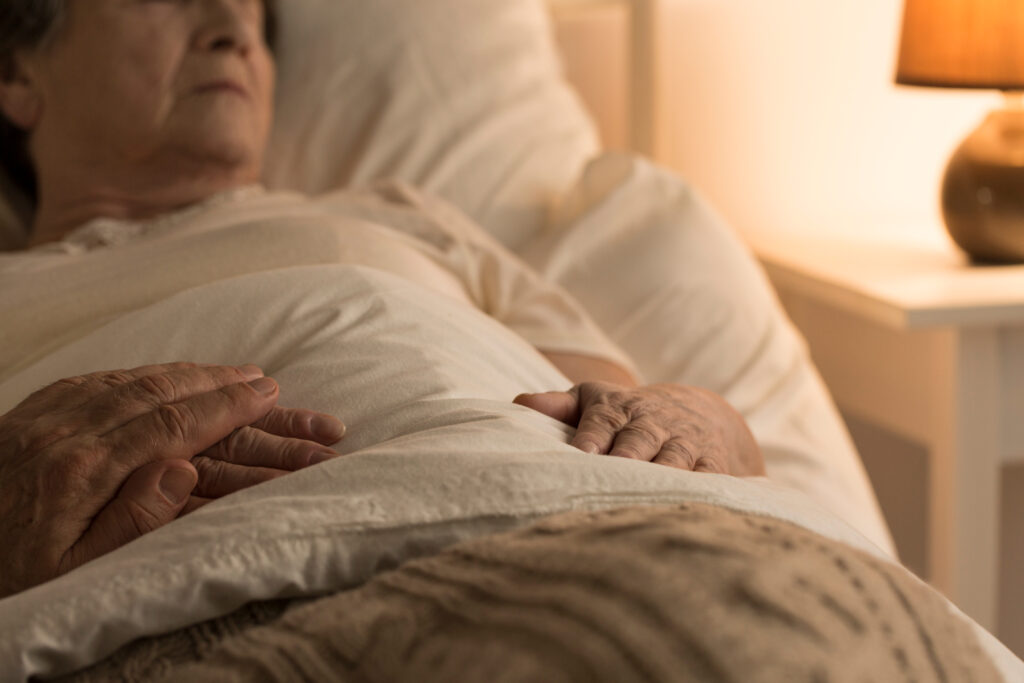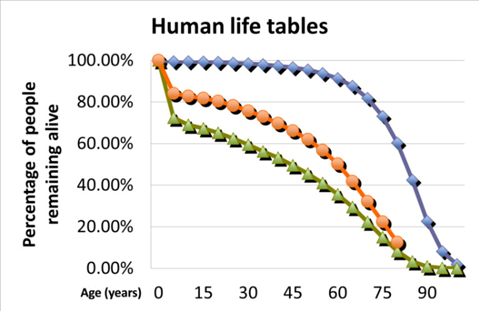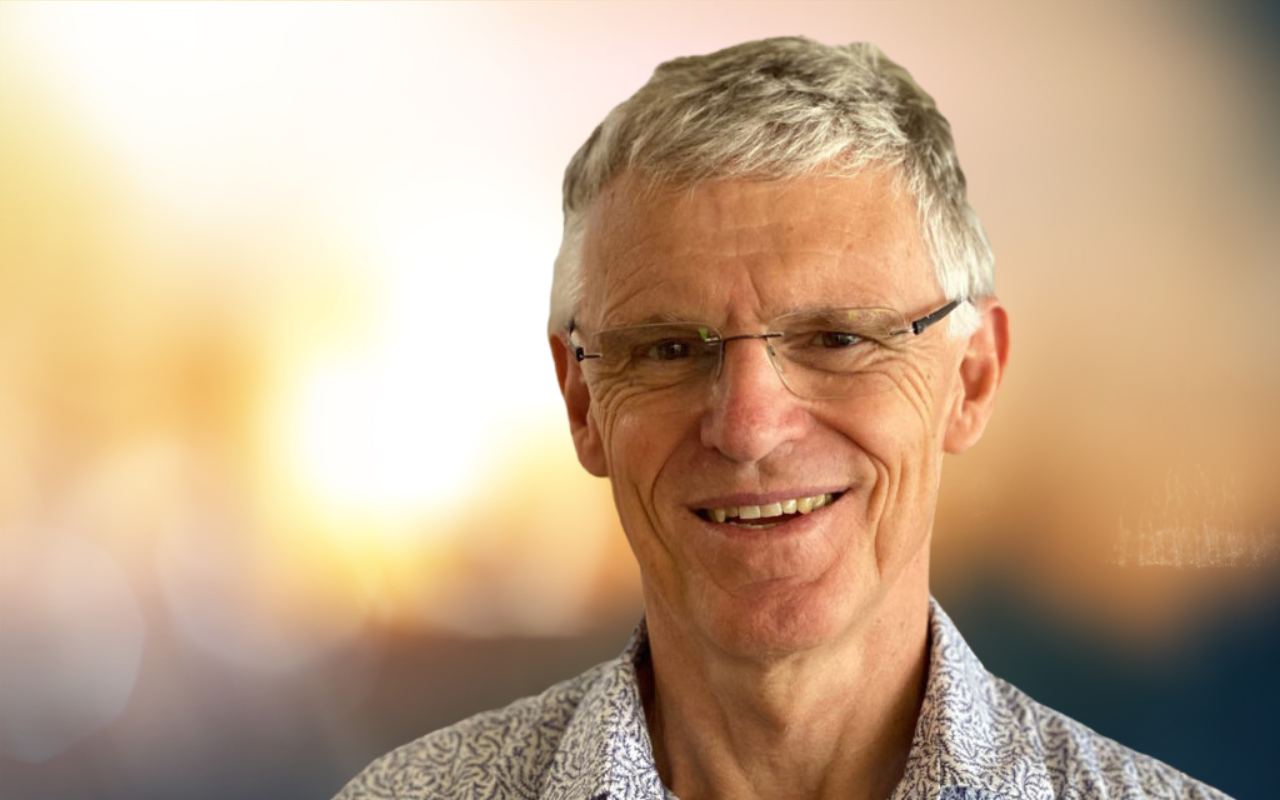Death in older people can be a consequence of the natural processes of their decline in biological old age, and there is no need to impose a pathological explanation, writes Dr Will Cairns.
Several weeks ago the Australian Institute of Health and Welfare (AIHW) released How long can Australians live?, a discussion, or perhaps a reflection, on mortality and maximum life expectancy, and what this means for Australians.
Coincidentally, a short while before that publication, I and several colleagues had been discussing the question of whether everyone needs a pathological cause, a reason, or a disease label for their death.
And last year, when Queen Elizabeth II died, her doctor wrote “Old Age” on her death certificate (here).
Over past years I have written a number of articles for MJA InSight+ on life expectancy, the need to accept death in old age as normal, and the concept of a finite lifespan ending in death (here, here, here, here, here, here, and most recently here). You may or may not chose to read any of them, but, later in this article, I have replicated a graph from the most recent of them.

In 2015, the Commonwealth produced its 2015 Intergenerational Report: Australia in 2055 (IGR). The Executive Summary states:
“Australians will live longer and continue to have one of the longest life expectancies in the world. In 2054–55, life expectancy at birth is projected to be 95.1 years for men and 96.6 years for women, compared with 91.5 and 93.6 years today.”
This statement is founded on the assumption that health care technology will continue to deliver the gains in life expectancy that it had in the past. And this in turn seems to be based on a further unstated assumption that people in their 80s, 90s and 100s will respond to emerging technologies in the same way as their younger selves.
The Intergenerational Report 2023: Australia’s Future to 2063 released last week was more cautious:
“Life expectancies will continue to rise, but the rate of increase is projected to slow.
Life expectancies at birth are 81.3 years for men and 85.2 years for women in 2022–23 and are expected to be 87.0 years for men and 89.5 years for women by 2062–63…..
I think there is reason to doubt these more recent predictions too. As we get older, an increasing number of us enter the phase of our individual maximum biological life expectancy when our ailments are less responsive to treatment as the cause of death changes (more on this later).
The 2023 IGR opens the door to a much broader discussion about what is normal at the end of life, whether we should abandon the 20th century approach to old age as a disease to be treated, and how the appreciation of death in old age as a normal end to life lived for its maximum possible duration might change the way that we deliver health care (here).
The AIHW report discusses the reality that although increasing numbers of people are reaching their 100s, this is not translating into significantly increased numbers of people who achieve 110 — the number of people who die over the age of 110 remains vanishingly small.
Improved disease prevention and treatment when young means that more people are living long enough to get chronologically old and approach their biological maximum lifespan (which itself has a normal distribution of ages). However, despite enabling more people to die as centenarians, better health care does not protect them from dying from the natural ageing that ends the lives of virtually everyone before they reach 110.
This should not be a surprise. Almost no-one has a biological maximum life expectancy of over about 110 years. Irrespective of the increased median life expectancy due to better health and health care, there is no reason to expect an impact on the numbers of people who live beyond 110 — doubling from one handful to two handfuls might be statistically significant but not socially meaningful.

As individuals we do not exist to live on forever. Indeed, that reality is the key to the success, the continuity, of life through evolution by natural selection in response to a changing world — that individual’s lives are finite allows their species to evolve and eventually become new species.
“Death is very likely the single best invention of Life. It is Life’s change agent. It clears out the old to make way for the new. Right now the new is you, but someday not too long from now, you will gradually become the old and be cleared away.”
Steve Jobs, CEO of Apple Computer and Pixar Animation Studios, Stanford University Commencement address, 12 June 2005 (here)
Evolution shapes the duration of individual lives within animal species to be as long as is necessary to support sufficient reproduction for species persistence. Our evolutionary success is not threatened by the fact that much of our body is not amenable to repair, or that many of our cells and cell lines have limited lifespans. Indeed, excessive longevity might become a liability for socially complex organisms.
There are many perspectives from which to understand our individual lives. One is to consider ourselves as a dynamic and ever-changing community of cells. Their collaboration produces the emergent phenomenon of “me” that undertakes the range of activities necessary to fulfil their/my biological goals, including engaging in the social behaviours at the next level of community necessary to achieve them. But each of those aggregations operating as “you” or “me” can only function for a period of time, and not the same amount of time for every individual of our species. Eventually, we wear out because every cell and all of our cell lines can only persist for so long — that is the way we are. And when our ageing community of cells can no longer muster the quorum necessary to sustain any one of the essential components of the complex entity that is “me” or “you” (the reader), it disbands.
How might this understanding change our approach to health care?
Perhaps we could start by integrating the reality that if we live long enough, we will all die of old age.
Most probably I will, like most people, develop a disease that can be held at bay for a time by modern technology, but eventually causes my death.
Or I may develop a number of concurrent conditions that together cause me to die. If they all contribute, then my doctor can choose the worst, or perhaps draw straws, to complete my death certificate.
But if I don’t die of something else first, the aged me will be so frail that I will eventually die from the first minor dysfunction that tips the balance of my viability, like the straw that breaks the camel’s back. I may well be comfortable, and everyone will know that I will die soon. They should be able to agree that I be left in peace, unburdened by a pointless search for a reason to die secondary to the global cause of my agedness — just as numerous of my palliative care patients had their deaths attributed to lung cancer, irrespective of whether the immediate cause was pneumonia, brain metastases, SIADH (syndrome of inappropriate antidiuretic hormone secretion), or any of the numerous other complications of that disease.
Strangely, however, if I do struggle on to attain my personal biological maximum life expectancy and just fade out, the Australian Bureau of Statistics (ABS) will not permit my doctor to write the underlying cause of “old age” or “frailty of old age” (here). So now, if because I have reached my maximum life expectancy I stop eating and drinking and peacefully go to sleep, and soon my heart stops and I stop breathing one night (or the other way round), the ABS tells my doctor that they must attribute a disease as the reason I died. We shouldn’t blame the straw. My cause of death could be celebrated because I had lived my life to its maximum biological potential.
We could ask the ABS to allow that people do die of old age or the frailty of old age. Doing so will promote a considered and individualised shift in the medical paradigm of health care in the very old from death caused by disease to death as the consequence of natural life-ending biological ageing. The focus of health care for biologically younger people can remain on disease cure and/or control, while the management of the symptoms that ail people consequent from their inevitable biological ageing can shift to the goal of comfort and quality of life.
I do not think it is ageist to observe that death in those old people who live long enough can be a consequence of the natural processes of their biological old age, and that there is no need to impose a pathological explanation.
If it was good enough for Queen Elizabeth II, surely the rest of us can be also allowed to die peacefully without suffering a disease, or its treatment?
Dr Will Cairns has retired from clinical practice as a palliative medicine specialist.
The statements or opinions expressed in this article reflect the views of the authors and do not necessarily represent the official policy of the AMA, the MJA or InSight+ unless so stated.
Subscribe to the free InSight+ weekly newsletter here. It is available to all readers, not just registered medical practitioners.
If you would like to submit an article for consideration, send a Word version to mjainsight-editor@ampco.com.au.

 more_vert
more_vert
Great thought provoking opinion piece…. When did we leave common sense out of medicine – is this an “evidence-free zone”?? I wholeheartedly agree with your opinion Will Cairns. I hope to die of “old age” following a fulfilling “Healthspan” not as a result of heroic efforts to prolong potentially poor quality increased lifespan.
Well done Dr Cairns !!
A breath of Common Sense in today’s world of politically correct niceties and its total abandonment of all rationality.
Keep going and tell men and women m what Life really means, and what it is about.
I respectfully disagree. As a Geriatrician I’ve fought the nihilism and ageism of my colleagues for years. Although correct in many aspects, the author appears to presume the processes and complications of ageing are immutable. This is demonstrably false, for example the frailty the author seems to see as inevitable can be prevented and reversed. A recent systematic review identified resistance exerciee as the most effective non-pharmacological intervention.
Totally agree Will; thanks for another terrific article. The need to provide a specific (and likely inaccurate) cause, especially for patients aged 90 and above who have been become gradually more and more frail in the years preceding their death, must skew the accuracy of statistics on death greatly. I have been getting away with listing ‘frailty’ but after reading your article recognise that I might be challenged on this in future.
Great article. We all have to die at some stage and it’s a pity our society finds it so difficult to talk about and accept death.
I understand that statistics help direct where health resources are directed.
Such resources should be focussed on premature death (&morbidity of course).
To be encouraged to make up a cause and sign off on it when one is not clearly evident, & investigation is ethically inappropriate, at a time when death is not premature, is a longstanding farcical situation.
All for the sake of statistics that end up inaccurate as a result of the policy.
Perhaps for those above a certain age we could certify “Natural death but direct cause not determined”
I agree, excellent article Will!
As usual, Dr Cairns preaches wisdom based on evidence. Life expectancy is continuing to increase for all Australians up to the early 90s where improvement becomes minimal, as is the increase in persons living 105+ years. As Dr Cairns and several commentators agree, the cause of death profile for ages 95 or older, reflects terminal events, or guesswork, rather than long-term diseases.
No. no. no. Every person lives forever, and thus cause and blame must be attributed when a person dies. The best person to blame is generally a doctor. For the record – I am being facetious and agree with the article which is a breath of fresh air.
Great article, highly relevant in a society that treats death like a tragedy rather than an inevitability. By always trying to find something to “blame” we treat the end of life in the elderly as a failure.
Thankyou for these reflections!
I was also surprised to read that the Queen’s cause of death was “old age” as had a death certificate returned for amendment when had put “extreme old age”.
Agree with all sentiments expressed above, and also that colleagues are putting respiratory or cardiac failure which indeed will skew data in the ABS.
I have spent over 30 years working in aged care as a GP in NSW.
About 10 years ago I started writing “Advanced Age” on death certificates as the cause of death when there was nothing specific. Initially I did this on people 100 years or older. I gradually took this down to 95 years before retiring from aged care work. This was never questioned.
The reason I did this was previously I’d guess “AMI” or “CVA” etc which distorts cause of death certificates I imagine.
If I hadn’t retired I would have continued to try down to about age 90 I guess.
As a JRMO facing my first death certificate and not having a diagnosis the registrar suggested myocardial syncope. Stood me in good stead over the training years and never rejected by the ABS but probably skewed their statistics.
I am a great believer that each of us has a use by date. Once the telomeres fail to reproduce cells then the normal consequence is death.
Excellent article Will.
I totally agree that for elderly frail people to be forced to nominate the “cause of death” as something other than the accumulation of multiple illnesses and the “straw” is unreasonable. Indeed, I suspect that it skews the data that is used to determining funding for all sorts of health issues.